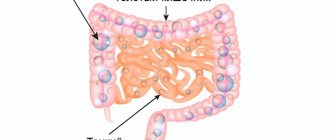From the moment of conception, a new life begins in a woman’s belly. Throughout gestation, the fetus is actively developing. All organs and systems begin to function long before birth. Therefore, while still in the womb, the baby is able to recognize the light that falls on the pregnant belly, reacts to loud sounds, and the voices of the parents often cause a special reaction. In the second half of pregnancy, vital skills are actively manifested, i.e. the child hiccups in the stomach, actively sucks his thumb, yawns, and swallows. The development of the fetus is described in detail in the article: “Intrauterine development of the fetus.”
All these reflexes are natural and should not cause concern. But hiccups, as an involuntary reflex, should be differentiated from “hypoxic” hiccups.
What causes hiccups?
The most important thing you need to know about your baby’s hiccups is that this is normal, both, for example, at 31 weeks, and earlier or later. Some mothers feel specific movements, reminiscent of hiccups, even in the middle of pregnancy. However, most often, hiccups occur in the fetus closer to 34 weeks, or even 36 weeks of pregnancy. And this is due to the fact that the baby is getting bigger, his activity is more noticeable to the mother through the walls of the abdomen, and also due to the fact that the child is maturing.
Exact knowledge of the reasons why children hiccup is not yet available. Most likely, this is one of the many stages of preparing the fetus for further independent life, one of the stages of its gradual development. It happens that a child often hiccups in the womb and this begins to bother the pregnant woman. Is everything okay with the baby? Shouldn't urgent measures be taken to ensure his health? In order not to worry in vain, you need to familiarize yourself with the possible prerequisites for the occurrence of hiccups:
- Swallowing amniotic fluid;
- Preparation of the respiratory system;
- Hypoxia.
A baby in the womb often swallows the water it is in. Amniotic fluid ensures the safety of the child and provides him with a nutritious environment. Studies of the behavior of children in the womb have shown that when glucose is added to the amniotic fluid, the fetus's swallowing movements become more frequent and greedy. In other words, the child tastes the waters around him and recognizes their taste. By 38 weeks he can swallow about 500 ml of amniotic fluid per day! Fluid can enter and exit the lungs through contraction of the diaphragm, which causes hiccups.
If a growing organism hiccups several times a day from 37 weeks onwards, this may indicate almost complete maturation of the respiratory organs (diaphragm, lungs) and their training for further life outside the womb. Such preparation does not cause danger or discomfort for the baby.
But what worries expectant mothers is the likelihood of intrauterine oxygen starvation. Hiccups do not necessarily indicate fetal hypoxia, but if it is particularly debilitating, long-term, or for some reason bothers and worries the pregnant woman, it is better to see a doctor and undergo the necessary examinations. From 30 weeks, CTG can be prescribed - cardiotocography, showing the baby’s heart rate. And at 32 weeks, a routine ultrasound is usually prescribed, the data of which can confirm or refute the presence of hypoxia. Moderate hypoxia can be corrected, which inspires hope and cannot but rejoice.
Possible reasons
You don't need to urgently call your doctor asking why your baby is actively hiccupping in his stomach. Gynecologists recommend not to worry, because this process is considered natural. Just relax and enjoy the feeling of your baby moving inside you. The phenomenon of hiccups in the fetus during pregnancy occurs regularly. Doctors still don’t have a consensus on what causes a baby’s hiccups.
- Assumption No. 1. Compression by the umbilical cord or diagnosis of hypoxia. When the hiccups are intense and repeat daily, the doctor prescribes an ultrasound scan. This is necessary to prevent the possible entanglement of the umbilical cord around the fetus's neck, which limits the flow of oxygen, interferes with breathing and increases not only the baby's increased movement, but also hiccups. If the doctor's fears are confirmed, then compression by the umbilical cord leads to uneven growth of organs and subsequent restriction of blood flow to the fetus.
- Assumption No. 2: Children, while still inside their mother, learn to use their lungs to swallow incoming oxygen through the umbilical cord. While breathing, your baby may swallow some amniotic fluid (amniotic fluid). Fluid entering the lungs sends a signal from the central nervous system to the brain, which causes the diaphragm to contract rhythmically. Therefore, in order to get rid of amniotic fluid that has entered the lungs, children begin to hiccup.
- Assumption No. 3. Sucking reflex. Another hypothesis under which hiccups may appear in the fetus is the development of the sucking reflex. This skill is necessary for the child for future breastfeeding and emotional calm. While thumb sucking in the womb, the baby involuntarily also swallows amniotic fluid, which causes hiccups. The presence of this process in a baby indicates good development of the central nervous system.
How to tell if your baby is hiccupping
For those who have not encountered manifestations of intrauterine hiccups, it is difficult to imagine what sensations the mother experiences and what this phenomenon looks like. How can you tell if your baby is hiccupping in his stomach? Hiccups may look like:
- rhythmic vibrations;
- short tapping and twitching;
- monotonous jolts or clicks.
Often a woman guesses on an intuitive level that the sensations she experiences are precisely the baby’s hiccups. It is impossible to predict the frequency and duration; for some it is 1 minute, for others it is an hour, once a week or many times a day. However, there is some correlation between hiccups and a pregnant woman’s consumption of sweet foods.
What is hiccups in a pregnant woman's stomach?
How to determine fetal hiccups?
The expectant mother can easily recognize the baby's first movements. Perhaps at first she does not realize that her feelings are the baby’s movements, but the more time passes, the more clearly she can be convinced of this. The child may noticeably push, turn and even hiccup. This happens around 20-26 weeks of pregnancy, when his nervous system has already formed. Hiccups - contraction of the diaphragm - can be recognized by the following signs:
- a feeling of pulsation or slight vibration, which are localized mainly on the right or left in the abdomen;
- rhythmic repetition of “tapping” at regular intervals;
- small twitches that feel like cramps.
In order not to confuse hiccups with tremors, you need to listen to your own feelings. It always has a certain rhythm, a push follows a pause at regular intervals.
By the way, the fact that a child may hiccup in his stomach does not mean that all children do this. Some pregnant mothers may never experience such sensations, while others experience them several times daily.
Sometimes the expectant mother feels the baby’s hiccups not from the side, as happens most often, but coming from the lower abdomen. Many people think that this is a sign that the baby has rolled over and is in a head-down position. If the hiccups are definitely felt from above, then in most women this gives rise to an unreasonable fear of the breech presentation of the fetus. In fact, the position of the child cannot be determined by this sign, because hiccups are a contraction of the diaphragm, it can be felt anywhere in the pregnant woman’s abdomen.
When can you feel a baby's hiccups?
A distinct feeling of baby hiccups in the stomach or the absence thereof can be explained by the following reasons:
- if the mother is thin and does not have a sufficient supply of subcutaneous fat, then she will feel the hiccups very clearly;
- increased and decreased sensitivity are the main reasons why hiccups will be somewhat noticeable;
- when the placenta is located on the anterior wall, the expectant mother begins to feel hiccups much later than the 26th week of pregnancy or does not feel them at all.
Hiccups of a child in the stomach of a pregnant woman:
begins from intrauterine oxygen deprivation, ingestion of amniotic fluid or pinching of the vagus nerve
How to help yourself if hiccups bother you?
At 33 weeks, the birth date is still quite far away, and it would be logical to get some sleep ahead of the sleepless nights with the new baby. But a pregnant woman’s peace is disturbed either by a pressed and quickly filling bladder, or by anxieties and worries associated with the upcoming birth and drastic changes in life. And if the baby also decided to be more active at night and decided to hiccup, what should he do then? Here the mother may be concerned not only about his well-being, but also about her own comfort.
What to do if a baby hiccups in the womb? If the baby is healthy and his hiccups do not bother his mother, then nothing. But when prolonged tremors bother you and prevent you from falling asleep, you should try to reconsider your diet and avoid eating sweets in the evening and before bed, because eating them can provoke contractions of the baby’s diaphragm.
When hiccups occur during the daytime, you can try other remedies. Changing body position, adopting a pose on all fours, and walking in the fresh air are effective. In addition, the mother’s physical activity, healthy sleep and a balanced diet serve as a prevention of that very hypoxia that no one wants to face.
Many mothers talk to babies in their tummy - at the behest of their hearts or in accordance with the recommendations of specialists, it doesn’t matter. The child in the womb is able to distinguish voices, sounds, and is sensitive to touch. If hiccups or excessive activity at an inopportune hour disturb the mother’s peace, you can gently talk to the child, put your hand on his stomach, and stroke him. Even if the baby does not calm down immediately, you will establish contact with him and calm down yourself. Remember that hiccups at any stage - both at 20 and 35 weeks - are absolutely normal.
What to do when a child hiccups in the stomach?
Those who first clearly felt the baby's hiccups in the stomach during pregnancy often succumb to panic. In this case, the right decision would be to seek advice from a specialist. First of all, in this case, the doctor will do an ultrasound, determine the degree of blood flow and conduct a CTG in order to exclude possible oxygen starvation of the child. As soon as the results of the study are received, treatment will be prescribed for an established diagnosis or the risk of developing pathology will be excluded. The last option is the most common.
If your baby's hiccups still cause you some discomfort, you can take some simple steps to reduce contractions of the diaphragm. Among them:
- change in body position;
- moderate load charging;
- walks in the open air;
- taking a knee-elbow position for 15 minutes;
- refusal of sweet foods.
Prevention of hypoxia
Hypoxia is the most dangerous diagnosis that can be identified when visiting a doctor because of a child’s hiccups. In order to exclude it in the future, you can follow a few simple rules that are useful for you and for the child:
- frequent walks in the fresh air;
- rejection of bad habits;
- breathing exercises;
- moderate physical activity (for example, yoga);
- avoidance of stressful situations.
Prevention with the help of medications is carried out only as prescribed by a doctor.
Expectant mothers usually have many questions. And the longer the gestation period, the more concerns there are about the health and developmental characteristics of the unborn baby. Often, even mothers “cheat” themselves when all the tests and indications are normal. The baby’s hiccups inside the abdomen belong to this group of unfounded fears. Why does a baby hiccup in the womb? Doctors say that his condition is completely natural and he is actively preparing for a future birth.
Important!!!
Toddlers begin to hiccup approximately in the middle of pregnancy. Some feel it at 24 weeks, others at 32 weeks. But there is no single time as such. Therefore, we can say that the baby’s nervous and respiratory systems are already sufficiently developed.
The main signs of hiccups are always the same, so they are easy to identify. You can understand that a child in the stomach has begun to hiccup by such signs as constant and rhythmic twitching of the baby in one place in the stomach, or its identical tremors for some time, or the so-called “ticking” inside the stomach with a monotonous knocking and pulsation below left or right sides of the abdomen.
Advice
You may also hear the same, small spasms with twitching of the abdomen and vibration exactly in the place where the twitching is most heard. Listen to yourself and your body more often.
Встречаются в свое удовольствие, на своей территории, проверенные феи проститутки Чита могут приехать к вам, на вашу территорию, проверь сам - oopschita.ru. В настоящее время существует огромное количество сайтов, но мы рекомендуем именно этот. Стильные проверенные феи проститутки Чита, страстные и желанные, они такие модельные и стройные, что у любого появится желание. Твои мечты и желания реализуются.









